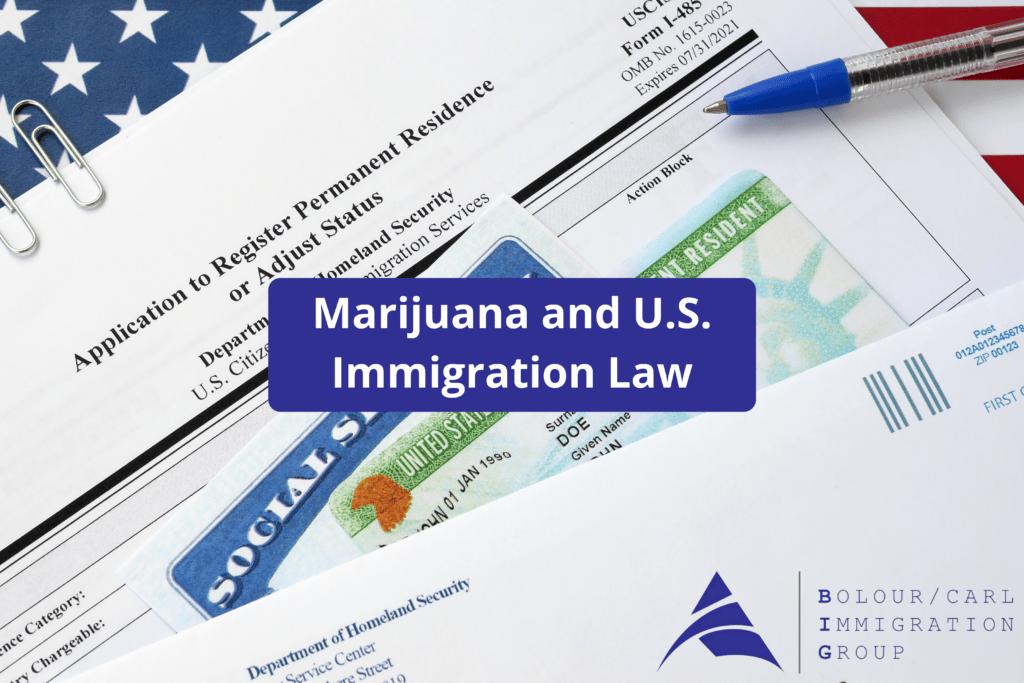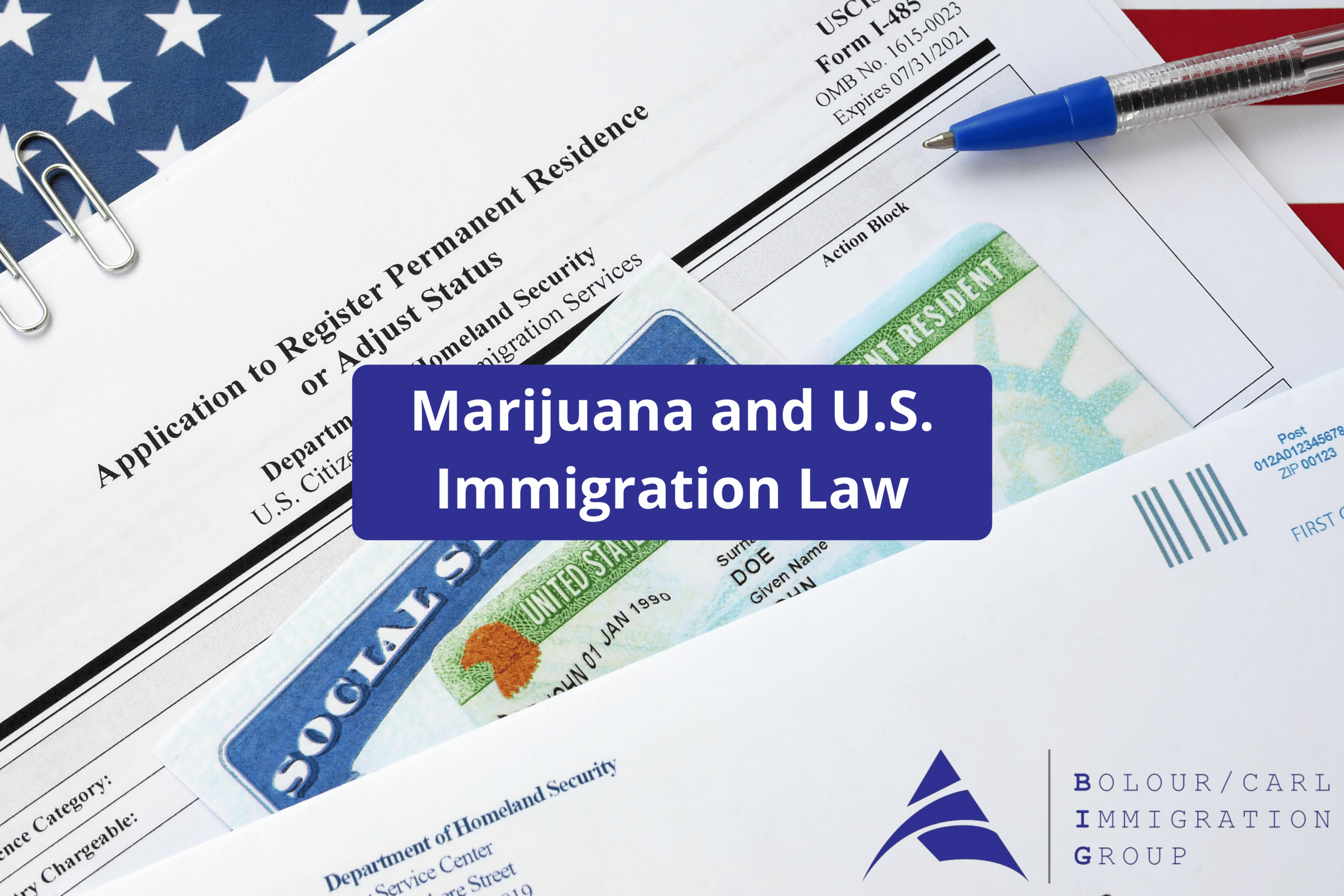
Many U.S. states have legalized marijuana, which may lead noncitizens to believe they can use marijuana without any immigration consequences. But possession of marijuana is still a federal offense, and immigration law treats any marijuana-related activity as a crime with harsh immigration penalties. If you are a noncitizen, you may be found inadmissible or removable, or you may be temporarily barred from applying for naturalization for marijuana-related activity – even if it’s legal in the state where it takes place.
State Laws
As of May 2021, medical marijuana has been legalized in 36 states and the District of Columbia, while recreational use of marijuana is now permitted in 18 states and the District of Columbia.
State medical marijuana laws typically require users to have a doctor’s order, which generally allows them to buy, own, use, and in some cases grow a small amount of marijuana, but not to give it away, sell it (without a license) or engage in certain other conduct.
In states allowing recreational use, adults are generally allowed, with some restrictions, to buy, own, use, grow and give away a small amount of marijuana, but not to sell it without a license or engage in certain other conduct.
Federal Laws
Federal law does not permit the use of marijuana, even medical marijuana. Although using or being under the influence of marijuana and possessing paraphernalia are not against federal laws, it is a federal offense to possess, give away, sell, cultivate, import or export marijuana, regardless of state law. However, there have been few recent federal criminal prosecutions for personal use, leaving American citizens who follow their state’s laws largely in the clear.
But as a noncitizen, you can be found inadmissible, denied entry into the United States, or have your application for adjustment of status or naturalization denied simply for admitting to marijuana use. Below are some of the most common scenarios in which noncitizens are penalized for marijuana-related activities.
Marijuana-Related Convictions
As a noncitizen, you can be deported for a marijuana-related conviction under the controlled substance ground, with the exception of one or more convictions that arise from a single incident involving possession of 30 grams or less for personal use, or certain closely related offenses. The controlled substance ground can also lead you to be declared inadmissible, even for convictions in which the amount was 30 grams or less. Therefore, even a lawful permanent resident who is convicted of possessing 30 grams or less of marijuana could be declared inadmissible. This means that if you travel abroad, you could be refused entry upon returning to the United States unless you qualify for and are granted a waiver or relief.
Also, a conviction will temporarily bar you from establishing good moral character (GMC), which is required over a span of several years for naturalization. If, during that period you fit the description in the controlled substance inadmissibility ground, you will need to start your GMC period all over again. (An exception is made for a single offense of simple possession of 30 grams or less of marijuana.)
If you have been convicted of a crime involving marijuana, consult an attorney before traveling outside the United States or filing for naturalization or adjustment of status.
Admitting to Marijuana Use
It’s imperative that you do not discuss conduct involving marijuana with immigration, consular, border, or law enforcement authorities unless your immigration attorney has advised you otherwise.
Formally admitting to marijuana use may cause you to be found inadmissible. (A discretionary waiver may be available if the admission was to a single instance involving 30 grams or less.) Further, according to the U.S. Citizenship and Immigration Services (USCIS) Policy Manual, admission of conduct is a bar to establishing good moral character required for naturalization, even if the conduct is legal under state law.
If you already have admitted to marijuana use to an immigration official, consult an immigration attorney as soon as possible. A verbal statement will not cause inadmissibility as an “admission” unless it meets certain requirements – for example, you must have voluntarily admitted to all of the elements of the offense after they were explained to you.
Marijuana Trafficking
As a noncitizen, you are considered inadmissible if the government has reason to believe (based on sufficient evidence) that you have participated in, aided or abetted the trafficking (for sale) of a federally defined controlled substance, including marijuana. You are also deemed inadmissible if within the last five years you have benefitted from such trafficking by an inadmissible spouse or parent. These scenarios are also conditional bars to establishing good moral character.
Lawful Employment in the Cannabis Industry
The cannabis industry is booming, despite it being technically in violation of federal law. Legal sales topped $17.5 billion in 2020, up 46 percent from the year before. While it may be tempting to seek employment in a burgeoning field, it is not recommended for noncitizens. If you work in the industry, the government may declare you inadmissible because it has reason to believe you participate in drug trafficking. Further, marijuana workers can be found inadmissible for admitting to a controlled substance offense, such as handling or preparing marijuana. According to the Foreign Affairs Manual, you can be found inadmissible under the national security/terrorism ground provisions for “traveling to the United States solely, principally, or incidentally to engage in ‘any other unlawful activity.’” Intent to engage with the cannabis industry is listed as a qualifying unlawful activity.
According to the USCIS Policy Manual, employment in the industry (like admission of conduct) is a bar to establishing good moral character required for naturalization, even if it is legal under state law. There have been instances in multiple states of naturalization application denials based on employment in the industry.
If you have ever worked in the cannabis industry, consult an immigration attorney before leaving the country or applying for naturalization or permanent resident status.
Addiction or Abuse
A finding of addiction to or abuse of any federally defined controlled substance, including marijuana, is a basis for inadmissibility if the condition is current, which typically is interpreted to mean use in the past year. If you are going through consular processing, be aware that you may be given a urine test to detect marijuana (and other substances).
Further, addiction or abuse that occurred after admission is grounds for deportation – although it is very rarely applied.
The Takeaway
It’s possible and perhaps even likely that federal laws concerning marijuana will change in the foreseeable future. But as the law stands now, noncitizens should avoid using marijuana recreationally and working in the marijuana industry and exhaust other alternatives before using medical marijuana. Further, texts and photos containing references to marijuana should be removed from your phone and social media. Noncitizens who have used marijuana or worked in the industry should consult an attorney before leaving the country or applying for naturalization or adjustment of status.
If you have questions regarding marijuana as it pertains to your immigration status or application, or if you need a deportation defense attorney, contact Bolour/Carl Immigration Group at 323-857-0034 or [email protected].


